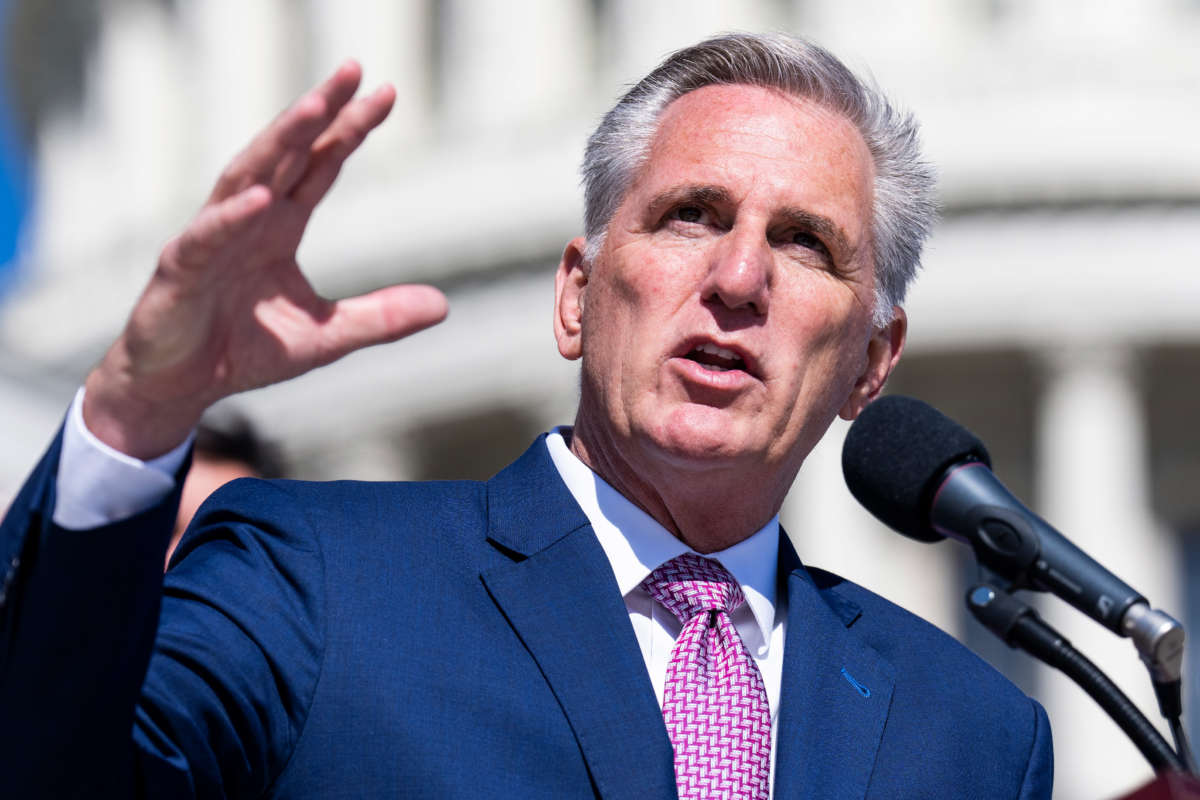If Republicans take control of the House this fall, they plan on using debt limit talks — and the possibility of throwing the U.S. into default — if they don’t get their way on slashing government programs.
According to a new interview with House Minority Leader Kevin McCarthy (R-California), the party is planning on using must-pass debt ceiling legislation to force through the GOP’s agenda.
“You can’t just continue down the path to keep spending and adding to the debt,” McCarthy said in an interview with Punchbowl News, ignoring the fact that economists view national debt obligations as often signaling the health of the economy. “We’re not just going to keep lifting your credit card limit, right,” he continued. “And we should seriously sit together and [figure out] where can we eliminate some waste? Where can we make the economy grow stronger?”
When McCarthy refers to eliminating so-called waste, it is likely that he is referring to, among other things, the GOP’s plans to cut Medicare and Social Security, two of the most popular and vital anti-poverty government programs in the U.S.
Republicans have been attacking the programs over the past months. Sen. Ron Johnson (R-Wisconsin) has threatened to put budgets up to congressional debate every year, which would almost definitely lead to cuts. Alarmingly, earlier this year, the Republican Study Committee, the largest Republican caucus in the House, put out a plan to raise the age at which people receive full benefits from both programs to 70, while implementing a rule that would raise the eligibility age over time.
The debt ceiling is an effective bludgeon for Republicans to use for this purpose. The debt ceiling accounts for government funding to provide promised payments for programs like Medicare and Social Security, as well as military salaries and other “existing legal obligations,” according to the Treasury Department.
Republicans had threatened to put the U.S. in default last September, after former President Donald Trump urged the party to do so. They appeared to be posing as deficit hawks — something they only do when a Democrat is in charge — while Democrats were debating the Build Back Better Act.
If they pull a similar move in 2023, it could be similar to 2011, when the GOP manufactured a debt ceiling crisis that ultimately “led directly to the worst recovery following a recession since World War II,” according to the Economic Policy Institute.
If the debt ceiling isn’t raised by fall of 2023, when the government is slated to run out of funding, the U.S. could find itself in a situation similar to last year, when it was at risk of defaulting on its loans. This could have triggered a global recession and would have disastrous short- and long-term consequences for the U.S., as the creditworthiness of the country would be ruined.
In other words, Republicans appear to be willing to hold the U.S. and global economy on the brink of disaster in order to force Democrats to capitulate to their demands.
This way, too, Republicans can blame whatever economic fallout will come with either a default, government shutdown or cuts to Medicare and Social Security on Democrats. By pursuing these cuts during a Democratic presidency, they can point fingers at President Joe Biden if they are pushed through — potentially providing the GOP with a weapon come the 2024 election.
Republicans are laying out other plans for if they take the House, which polls say they are likely to do. GOP members of the House Education and Labor Committee have made a list of prominent labor officials like Labor Secretary Marty Walsh and National Labor Relations Board General Counsel Jennifer Abruzzo as well as Biden’s pro-worker task force to target with hearings and attacks if they take control of the House.
Press freedom is under attack
As Trump cracks down on political speech, independent media is increasingly necessary.
Truthout produces reporting you won’t see in the mainstream: journalism from the frontlines of global conflict, interviews with grassroots movement leaders, high-quality legal analysis and more.
Our work is possible thanks to reader support. Help Truthout catalyze change and social justice — make a tax-deductible monthly or one-time donation today.
